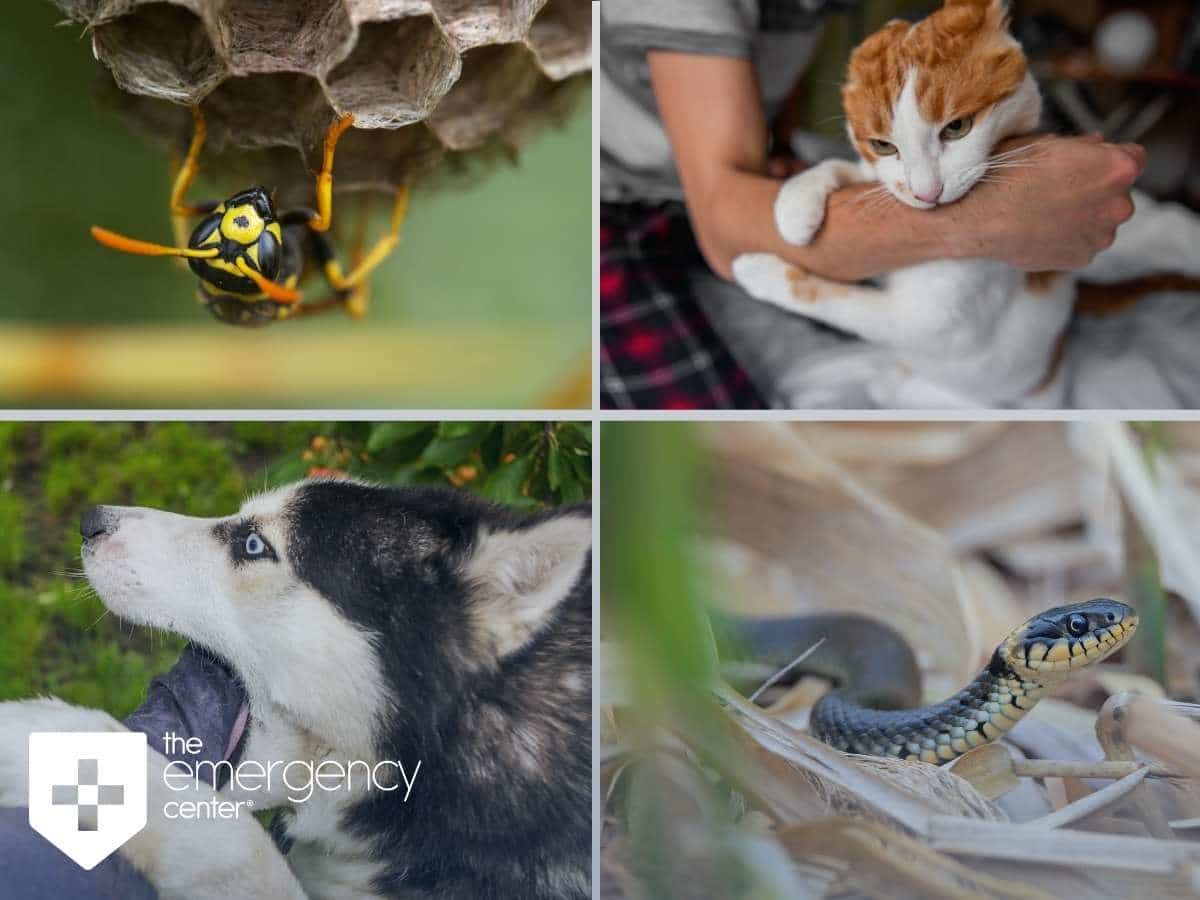Animal & Insect Bites
Useful Tips To Deal With Domestic & Wild Animal Bites
Springtime offers perfect outdoor weather; it isn’t too hot or too cold for adults and kids alike to enjoy the great outdoors. However, being outdoors can be potentially dangerous. From stray dogs to venomous snakes, animals can cause serious harm to unsuspecting people, and quite often send them scurrying to The Emergency Center for treatment. Here are typical bites and what to do if it happens to you.

Treating & Preventing Dog Bites To Avoid Rabies
Dogs are loyal companions, but they can also be aggressive when threatened. Children are probably unaware when one may be ready to attack, so it is no surprise that 50% of all children suffer from a dog bite by the time they reach age 13. Each year, 800,000 bites are severe enough to require medical attention in the United States. Here are some facts about the dangers, treatment, and prevention of dog bites:
- Rabies and Infection. Though most domesticated dogs are vaccinated, it is essential to know the risks of rabies and bacterial infections that can follow a dog bite. Rabies is especially a cause for concern because the disease is fatal if left untreated. Other viruses may result from a dog bite as well. Be on the lookout for signs of infection (including redness, fever, swelling, puss and foul odor coming from the wound) after an attack. Symptoms typically develop within 24 hours.
- Treatment. It is essential to wash the injury and wrap it tightly. Ointments such as Neosporin help prevent infection, but stronger antibiotics and rabies vaccines should be provided by a doctor. Severe cases can require surgery.
- Prevention. Dogs attack out of fear. They attack when pestered too much and when defending their owners or possessions. Fortunately, most dogs do not bite. The best way to prevent dog bites is to become familiar with and stay away from aggressive breeds and especially stray dogs, because they may have rabies. They may also carry fleas, ticks, or other parasites.
How To Properly React To Cat Bites & Scratches
Although not as talked about as dog bites, cat bites are just as serious. Their claws are sharp and bacteria-ridden, and their teeth can deeply puncture the skin. Cat bites account for about 5 to 10% of animal bites, and Up to 50% of cat bites become infected.
- Infection. Cat bites are surprisingly dangerous because they have a significant amount of bacteria in their saliva that can enter the bloodstream. The result can be very painful and can lead to permanent tissue damage if left untreated.
- Treatment. People should seek medical attention immediately after an attack from a cat because the injury closes up quickly. This will often develop into an abscess infection underneath the skin, which can become serious. If bitten, first wash the wound very well to remove all bacteria and head to an ER for treatment. The doctor can prescribe powerful antibiotics and pain medication if the bite is severe or may become infected.
- Prevention. Just as with dogs, children and adults should stay away from stray cats, or even cats that they do not know. Cats can be very unpredictable and some are more aggressive than others, so approach them very carefully.
Wild Animal Bites Always Need Immediate Treatment
While bites from domesticated animals such as dogs or cats can be painful, outdoor animals are even more cause for alarm. Animals such as possums, squirrels, rats, raccoons, and other outdoor dwellers are harbingers of many parasites. These animals are far more likely to carry rabies and other deadly
bacteria. Parents should take caution when they allow their kids to play outdoors, especially during camping trips. Bites from these animals require immediate medical treatment because no one can be confident that they aren’t carrying disease, so it’s always better to be safe than sorry.
How To Proceed When Bitten By Venomous Snakes
Bites from venomous snakes can be life-threatening but these animals don’t typically seek out people. However, they are extremely territorial and will not hesitate to attack when they feel threatened. They often come as a surprise when one is hiking or camping, as they blend in well with their surroundings and can go unnoticed – until it’s too late.
- Dangers. Since there are so many varieties of the species, it is often difficult to identify the snake and precisely determine how urgently the victim may need medical attention. Because bites from these animals can be fatal, every snake attack is considered to be an emergency.
- Treatment. Side effects of venomous bites begin quickly because the venom is intended to act rapidly. Victims need to provide emergency responders with as much detail of the snake’s appearance as possible. Anti-venom is the only way to stop the poison from spreading through the victim’s body, but for bites from snakes known to be less venomous, a doctor will provide the patient with a tetanus shot.
- Prevention. The best way to prevent venomous bites from a snake is to be mindful of one’s surroundings. For instance, stay away from wooded areas and tall grass where they may be hiding. Know the habitats of these potentially deadly creatures and stay far away. Parents should make extra sure to warn their children to avoid being near snakes, as they are known to not play well with others.
What About Bee Stings & Insect Bites?
Animal bites are not the only danger during Spring, as stings from flying insects such as bees, wasps, hornets and the like are more common this time of year. Many children are allergic to stings, so it is essential for parents to educate them on how to avoid a deadly attack. These insects can be highly aggressive and extremely territorial so it is best to stay away from their colonies or hives, which may be built inconvenient places like beneath the eaves of a home. Although they rarely attack unprovoked, these creatures will stop at nothing to eliminate any threat. People known to be allergic should keep an EpiPen handy and immediate medical attention is often required for these types of stings.
Visit Our Freestanding ER In Case Of Animal Bites
If you are bitten by an animal or insect, the bite itself can be an immediate emergency – but a severe infection could set in later. Do not hesitate to come to The Emergency Center right away. The Emergency Center provides up to 23 hours of Observation and offers 24/7 care with NO WAITING. Visit The Emergency Center’s convenient 24-hour location in San Antonio.
The Emergency Center
San Antonio
11320 Alamo Ranch Pkwy
San Antonio, TX 78253
Phone: 210-485-3644



